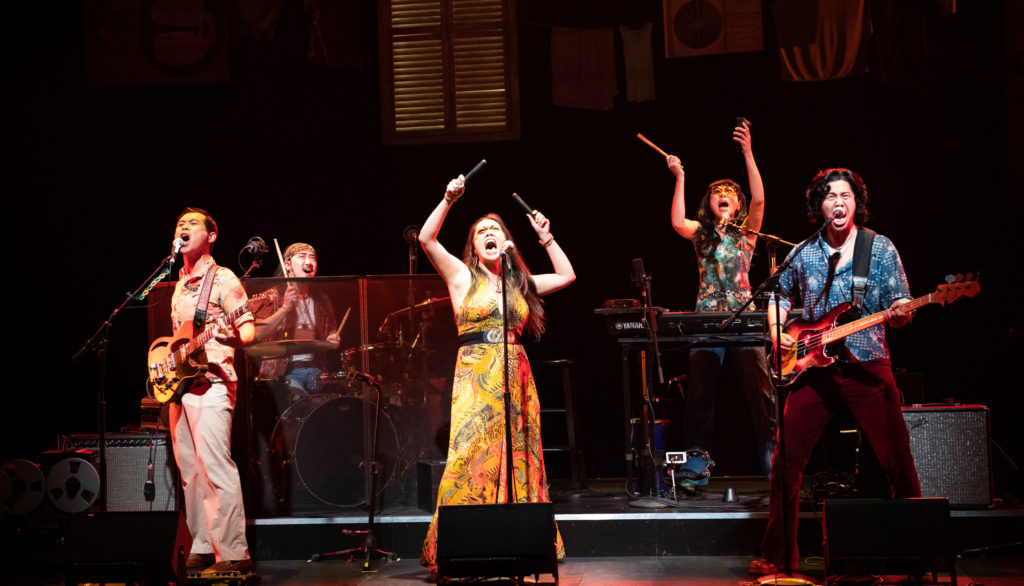
Joe Ngo, Abraham Kim, Brooke Ishibashi, Jane Lui and Tim Liu in Cambodian Rock Band. Courtesy of Margot Schulman
By Southwester Staff
A rollicking rock musical about a genocide might seem like a contradiction in terms, but over its two-and-a-half hour run time, Arena Stage’s Cambodian Rock Band reveals itself to be a story of love and loyalty, secrets and hidden memories, and questions of whether we can ever really know our families – or ourselves. And what could be more rock-and-roll than that?
Written by Lauren Yee and directed by Chay Yew, the show jumps through time, fracturing chronology into a kaleidoscopic story centered on the Cambodian New Year at three essential moments in the country’s history: April 2008, April 1978 and April 1975.
In the near-present storyline, Neary, an American-born human rights worker living in Cambodia, receives an unexpected visit from her Cambodian-born father, Chum. As she digs into a history her father would rather keep hidden, audiences are returned to the 1970’s, when rock and roll ruled Phnom Penh. The familiar strivings of a teenage band with big dreams are intertwined with the rise of the Khmer Rouge and the resulting genocide that took the life of approximately two million Cambodians – including ninety percent of the country’s musicians. Against all odds, many of their recordings survived, a historical fact the production lifts into a symbol of the parts of the human spirit that can never be extinguished, even in the darkest of times.
The show’s music, performed live by the multi-talented cast, merges traditional Cambodian rock classics with new songs written by real-life Cambodian rock band Dengue Fever, whose latest album in a 20-year career is named for a Ting Mong, a Cambodian cultural effigy of protection usually placed at the entrance of a home or village. Attempts to ward off evil may be a nearly universal cross-cultural tradition, but the book and lyrics for Cambodian Rock Band instead choose to dive directly into its beating heart.
Narrated by a hilariously sinister rendering of Comrade Duch, the commander of the Khmer Rouge’s notorious S-21 prison, the show takes audiences out of space and time, presenting alternate versions of memory and history and asking direct questions about who tells a story and what truth they choose to present. In his portrayal of Duch, actor Francis Jue layers the character’s guilt over the torture and murder of thousands of people with the peppy persona of a cruise director and the stage presence of a late-night talk show host, bringing down the house with a fearless sense of comedic timing.
Reflecting the show’s core message – that each of us contain multitudes and are not defined by any one experience – the cast slips seamlessly in and out of multiple roles. Joe Ngo plays Chum at every stage of his life, from a young rocker who is quickly aged by his experiences under the Khmer Rouge to a middle-aged immigrant dad who mixes up English phrases and pulls tour guides from his belted fanny pack.
“To be honest, there is no secret to playing that large of an age gap, only years of refinement and hard work,” Ngo said in a written interview with The Southwester. “I never separate the fact that young Chum and old Chum are the same person; except that one is older, which means he simply carries his experiences with him throughout that journey. When he is young, he is less encumbered by such experiences, by not knowing what is to come; and so, it is always my task to stay open for discovery as we see his early life unfold.”
Himself a child of Khmer Rouge survivors, Ngo said his portrayal of Chum “had to start from my home base, from my own parents (uncles, aunts, elders, et al.) who actually survived the camps, and from the intergenerational trauma imparted upon me. Even during the earliest workshops, whenever I took on Chum’s voice, I could hear my father bouncing back into my ears; ghostlike, haunting, with a demand to tell this story the right way. In short, as an actor, my work in this play has been a balancing act between what constitutes the safety of a fictionalized story (the play, the stage) and the authenticity of its telling (our connection to the material, the non-fictional history).”
Brooke Ishibashi plays Chum’s daughter Neary through her emotional discovery of her father’s past, as well as Sothea, the lead vocalist for the 70’s rock band Chum gave everything to support. Ishibashi’s performance is inspired by a remarkably resonant personal story, as her maternal grandmother, Mary Kageyama Nomura, was known as “The Songbird of Manzanar” during her imprisonment in a California internment camp for Japanese-Americans during World War II, and her parents met as members of a 1970’s R&B band. Actor Tim Liu embodies multiple characters, including Neary’s NGO-worker boyfriend in the 2008 storyline, the bassist for the rock band in 1975 and a deeply conflicted Khmer Rouge lieutenant in 1978.
The production weathered a series of twists and turns, including a cancellation in the tempestuous post-COVID era and a rebirth as a partnership of five individual theaters to bring it to the stage. The clever writing, rousing rock soundtrack and unbridled passion of its performers add up to a show that – much like the power of music itself – cannot be sidelined.
Cambodian Rock Band runs through August 27 at Arena Stage. On-stage portrayals of violence may be disturbing to some viewers. More information at www.arenastage.org.

